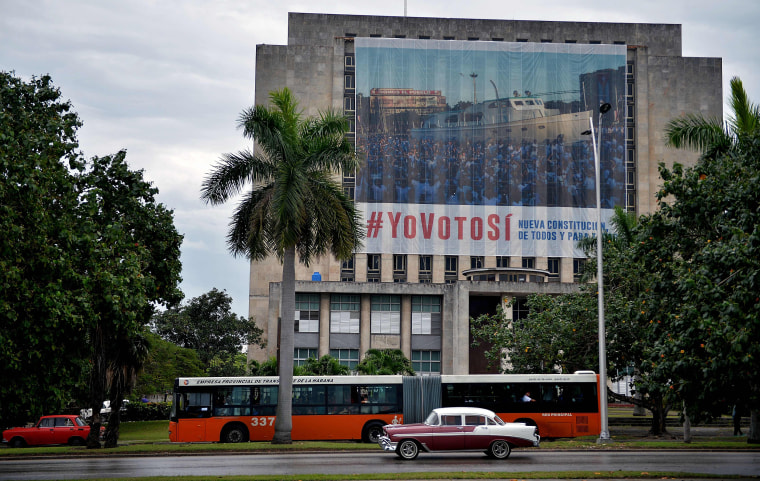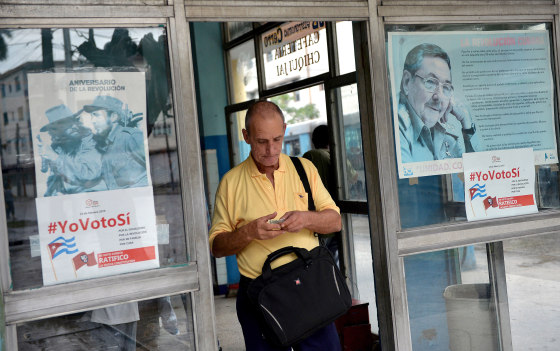HAVANA — Cubans are heading to the polls Sunday for a constitutional referendum, and although it is expected to be approved overwhelmingly, experts say it could receive an unusual amount of rejection.
The draft constitution contains important changes, but retains the island's one-party communist system. It legitimizes private businesses that have been opening for the past decade and acknowledges the importance of foreign investment.
Experts believe the vote has become a referendum on people’s support for the 1959 communist revolution at a time when Cubans are feeling freer to voice their opinion.
In one of the last communist nations in the world, the government has been on an extensive propaganda campaign throughout the country, promoting #YoVotoSi (#IVoteYes) on television, and social media. Signs can be seen on buses and public buildings.
Cuba's president Miguel Díaz-Canel and his wife lined up outside a polling station early Sunday morning to cast their ballot. Speaking to the press after voting, he criticized what he called "imperalist threats" from the U.S. towards Cuba, Venezuela and Nicaragua and urged Cubans to vote "yes" on the referendum.
Jorge Rodriguez, 36, says he will vote "yes" on Sunday. “There are things I have to thank the revolution for.” Before becoming a taxi driver Rodriguez went to vocational school for free. “I have never had to worry about what a hospital costs,” he added.
But critics say reforms to the island’s political system were never considered even though they were brought up: After the first draft was published in July, community meetings were held nationwide over a three-month period so citizens could voice their opinions. During the meetings, many Cubans called for direct election of the president and other officials but these demands were not reflected in the final draft.
A new constitution amid big changes?
For the first time in over 60 years, neither the late Fidel Castro nor his younger brother Raul are at the helm. More Cubans have traveled outside the island since Castro ended the exit permit in 2013, exposing them to different views and governmental systems. Moreover, Cubans are increasingly connecting to the internet — according to the government, it's up to 6.4 million out of its 11 million residents.
Cuba is grappling with a stagnant economy, yet it's been losing one of its strongest allies, Venezuela, a country in the midst of political and economic crisis and growing international calls for its leader, Nicolás Maduro, to step down.
Cuba’s civil society is more vocal. With more access to internet, activists have turned to social media to promote their #YoVotoNo (#IVoteNo) campaign.
René Gómez Manzano, 75, a lawyer and member of the opposition, says he has spent decades not showing up to the polls “to not be an accomplice of the regime.” This time he says he will vote "no."
“It will be a message to the government that it must recognize there is a significant percentage of the population that is not in agreement with the [political] system,” Manzano said.
Cuban government officials will be looking to see if there is an increase in the amount of dissent during Sunday’s vote. In a nation with only one political party, candidates for government usually garner a “yes” vote well above 90 percent. The current constitution was approved in 1976 with 97.7 percent approval.

There are no opinion polls or independent mass media in Cuba, but the draft is expected to be ratified overwhelmingly. Arturo Lopez Levy, a former analyst with the Cuban interior ministry who is now a professor at Gustavus Adolphus College, calculates that the level of dissent will be around 15 to 30 percent.
This number includes “no” votes, those who abstain through an intentionally annulled ballot, and people who do not show up to the polls. For the government, a ‘no’ vote is considered a vote for the opposition, while annulled ballots and no-shows are considered discontent.
“They have to understand the message: support for the revolution has eroded. The question is by how much,” said Lopez Levy. “It is important to look at what level the discontent reaches.”
Catholic and evangelical leaders have also been promoting a “no” vote and its members are expected to widely reject the proposed constitution. Catholic leaders cited the draft’s ideological bent, denial of access to media and education, and they say it allows foreigners, but not Cubans, to invest in the island.
One of the more controversial revisions in the final draft was the elimination of a proposed article that would have legalized same-sex marriage by changing it to mean between two people instead of between a man and a woman. It was the article that sparked the most disagreement, with conservative groups rejecting the proposal.
The final draft reinserted the aim of “advancing toward communism” that had been removed from the first draft. Officials said its removal from the first version sparked concern among thousands of citizens.
Some members of the opposition who promoted the "no" vote have been temporarily detained after their homes were raided leading up to the referendum.
Results of the referendum will be announced Monday afternoon.
Carmen Sesin reported from Miami and Orlando Matos reported from Havana.



